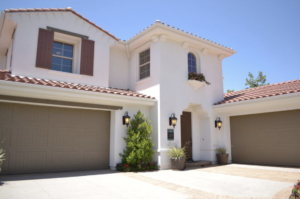Serving Charlotte, Monroe, Concord &
All Of Mecklenburg County
Menu
The building industry (and homeowners) learned some valuable lessons from Hurricane Andrew in 1992, Katrina in 2005 and Sandy in 2012. After each hurricane ravaged the coast, each state adopted stricter building codes requiring new or replacement garage doors to be structurally reinforced to withstand higher wind load requirements. Now codes require the doors have stronger bracing, heavy-gauge tracking, and other necessary hardware to help keep them in place under extreme winds.
In Florida, houses that conformed to the codes were better able to withstand the onslaught of subsequent storms. Homes equipped with garage doors that were installed before the revised code took effect suffered significant damage, or the doors were blown out completely, leading to further destruction of the houses.
We at Restoration 1 of Greater Charlotte know the damage risk is substantial. According to the Federal Alliance for Safe Homes, about 80 percent of residential hurricane wind damage starts with wind entry through garage doors. FEMA has more information about protecting your home at FEMA.gov.

Because of their large size, garage doors are highly susceptible to wind damage. According to FEMA, if the garage door is lost during a hurricane, internal pressure can uncontrollably build up, allowing massive winds to blowout the home’s roof and supporting walls.
Your garage door is only held in place by the rollers in the track. When the wind blows at the door, it creates positive pressure – the higher the wind speed, the greater the pressure. As the pressure increases, the door bows inward and the ends of the door are pulled toward each other (or toward the center of the door) as well as causing the roller to tilt an angle. Since the front of the tracks are flat, the rollers pull right out of the tracks and the door sucks inward.
If you think your home is at risk, have our team inspect it before you replace it. After thousands of water damage clients, the technicians can make suggestions to protect your home. Perhaps you need more internal support, better drainage, or even adding shutters.
If you do need to shop for new doors, here are some points:
Water damage in the garage can cause structural damage. When the moisture isn’t addressed immediately, mold and mildew can also form. You need to get the professionals involved right away. Our team provides certified water damage restoration services for homes in Greater Charlotte.
Our experts design a plan for your home that ensures your property is 100% dry by using the best equipment in the industry. As soon as you discover a leak or water damage, contact Restoration 1.